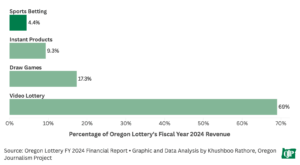The NBA gambling scandal highlights Oregon’s role in sports betting. For all the hoopla—and harm—it doesn’t generate much revenue for the state.
By Khushboo Rathore
Oregon Journalism Project
Oregon, a state that prides itself on innovation, can now claim another first: the first state with a professional sports team whose coach was arrested by the FBI and charged with scheming to rig illegal poker games.
The recent bust of ex-NBA star and Portland Trail Blazers coach Chauncey Billups focused a national spotlight on Oregon, the NBA and gambling.
But that glare, so far, has obscured the size and impact of Oregon’s sports betting industry.
Gambling revenue is an important segment of the state of Oregon’s budget. In the 2024 fiscal year, Oregon took in more than $1.7 billion in gambling revenues.
But the percentage of this amount that comes from sports betting—despite the relentless TV ads for state-sponsored offerings from DraftKings, complete with bet $1, get $100 in credit teasers—is only 4.4%, an Oregon Journalism Project analysis shows.
Video lottery, the vast network of colorful pseudo-slot machines found in bars, restaurants and lottery delis across the state, provides the Oregon Lottery with nearly 16 times as much revenue as the more glamorous sportsbook.

Oregon Lottery revenues flow into the State Treasury and fund programs for education, parks, economic development, veterans programs, and even a tiny bit for treatment of gambling addiction, among other expenditures.
A 2018 U.S. Supreme Court decision legalized sports gambling nationwide. In 2022, after a false start with a Maltese betting company, Oregon contracted with DraftKings, the huge online gambling company, to handle the state’s sports betting.
Oregon gets 51% of the net revenue from sports gambling—the amount left over after payouts, DraftKing’s cut, and other costs.
Although only a small portion of Oregon Lottery revenue, sports betting is the agency’s fastest-growing segment. From 2023 to 2024, its revenues jumped 36%, reaching $75 million, the OJP analysis shows.
Critics say that’s a dangerous trend. Kitty Martz, executive director of Portland’s Voices of Problem Gambling Recovery, argues that the harm caused by sports gambling heavily outweighs the benefits. Martz notes that unlike conventional lottery products, which are available only at retail locations during business hours, sports betting is accessible by cellphone anytime, anywhere.
“It becomes very all consuming,” Martz says. “Younger, educated men are starting to be more affected by gambling harm.”





